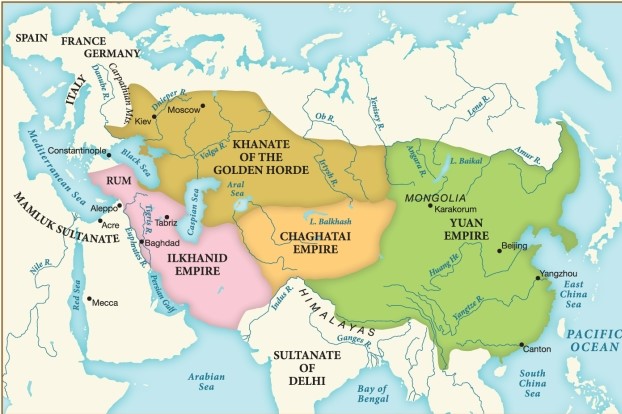Exam 12: The Medieval Synthesis and Its Cracks, 1215-1340
Exam 1: Early Western Civilization, 400,000-1000 B.C.E65 Questions
Exam 2: Near East Empires and the Reemergence of Civilization in Greece, 1000-500 B.C.E64 Questions
Exam 3: The Greek Golden Age, C 500-C 400 B.C.E65 Questions
Exam 4: From the Classical to the Hellenistic World, 400-30 B.C.E65 Questions
Exam 5: The Rise of Rome and Its Republic, 753-44 B.C.E64 Questions
Exam 6: The Creation of the Roman Empire, 44 B.C.E-284 C.E65 Questions
Exam 7: The Transformation of the Roman Empire, 284-600 C.E64 Questions
Exam 8: The Heirs of Rome: Islam, Byzantium, and Europe, 600-75065 Questions
Exam 9: From Centralization to Fragmentation, 750-105065 Questions
Exam 10: Commercial Quickening and Religious Reform, 1050-115065 Questions
Exam 11: The Flowering of the Middle Ages, 1150-121565 Questions
Exam 12: The Medieval Synthesis and Its Cracks, 1215-134065 Questions
Exam 13: Crisis and Renaissance, 1340-149265 Questions
Exam 14: Global Encounters and the Shock of the Reformation, 1492-156065 Questions
Exam 15: Wars of Religion and the Clash of Worldviews, 1560-164865 Questions
Exam 16: Absolutism, Constitutionalism, and the Search for Order, 1640-170065 Questions
Exam 17: The Atlantic System and Its Consequences, 1700-175065 Questions
Exam 18: The Promise of Enlightenment, 1750-178965 Questions
Exam 19: The Cataclysm of Revolution, 1789-179965 Questions
Exam 20: Napoleon and the Revolutionary Legacy, 1800-183065 Questions
Exam 21: Industrialization and Social Ferment, 1830-185064 Questions
Exam 22: Politics and Culture of the Nation-State, 1850-187065 Questions
Exam 23: Empire, Industry, and Everyday Life, 1870-189065 Questions
Exam 24: Modernity and the Road to War, 1890-191465 Questions
Exam 25: World War I and Its Aftermath, 1914-192965 Questions
Exam 26: The Great Depression and World War II, 1929-194565 Questions
Exam 27: The Cold War and the Remaking of Europe, 1945-1960s64 Questions
Exam 28: Postindustrial Society and the End of the Cold War Order, 1960s-198965 Questions
Exam 29: A New Globalism, 1989 to the Present65 Questions
Select questions type
Although Louis IX was generally supportive of the papacy, he simultaneously maintained the monarchy's independence from ecclesiastical authority, as exemplified by which of the following?
(Multiple Choice)
5.0/5  (33)
(33)
In the thirteenth century, papal attempts to bring all of Christian Europe under the guidance of the pope suffered severe challenges. Describe the ways in which several thirteenth-century popes attempted to assert and define their power. How did these attempts conflict with the goals of the German emperor Frederick II and the French king Philip the Fair? By the end of the century, how had these struggles affected the positions of the pope, the German emperor, and the French king?
(Essay)
4.9/5  (43)
(43)
Which of the following is evidence that the message of mendicant friars preaching in towns, cities, and villages was enthusiastically received?
(Multiple Choice)
4.7/5  (30)
(30)
How did Pope Innocent try to realize his vision of the papacy as the supreme lawmaker and of law as an instrument of moral reform?
(Multiple Choice)
4.9/5  (36)
(36)
The French king Philip IV (Philip the Fair) wanted to tax the French clergy to finance which of the following?
(Multiple Choice)
4.8/5  (31)
(31)
After 1260, much of the territory of modern-day Russia was under the control of the

(Multiple Choice)
4.8/5  (37)
(37)
What factor may have pushed the Mongols on to the path of aggressive expansion in the twelfth and thirteenth centuries?
(Multiple Choice)
4.8/5  (32)
(32)
The Fourth Lateran Council promoted the doctrine of transubstantiation, which referred to that moment in
(Multiple Choice)
4.8/5  (35)
(35)
What is scholasticism and what are some of the characteristics of scholastics? Who were the scholastics most inspired by, and who became the most famous scholastic? Explain the work of the most famous scholastic and how this style of work impacted society overall.
(Essay)
4.9/5  (43)
(43)
Why was the impact of the Fourth Lateran Council's measures against illegitimate births less than council members had hoped?
(Multiple Choice)
4.8/5  (46)
(46)
Which statement best characterizes the views of most medieval scholastics, including Thomas Aquinas?
(Multiple Choice)
4.9/5  (43)
(43)
Which scholastic denied that human reason could be used to find God, proposing instead that human reason was dependent on divine illumination?
(Multiple Choice)
4.8/5  (29)
(29)
The Fourth Lateran Council (1215) was called by Pope Innocent III to clarify church doctrine. How did it contribute to the development of inquisitions? Whom did inquisitions target, and what did they do to their victims?
(Essay)
4.9/5  (43)
(43)
What factor allowed Marco Polo and other traders to reach China in the late thirteenth and early fourteenth centuries?
(Multiple Choice)
4.8/5  (31)
(31)
Showing 41 - 60 of 65
Filters
- Essay(0)
- Multiple Choice(0)
- Short Answer(0)
- True False(0)
- Matching(0)